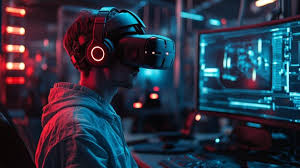
Will Virtual Reality and Motion Sensors Redefine Gaming?

Will VR and Motion Sensors in Gaming Lead to a New Revolution?
The gaming industry is on the brink of a major transformation, and VR and motion sensors in gaming are at the forefront of this revolution. Over the past few years, technological advancements have brought virtual reality (VR) and motion sensing to the mainstream, offering players an unprecedented level of immersion. But can these innovations truly reshape the future of gaming?
How VR is Changing the Gaming Landscape
Virtual reality is arguably the most exciting innovation in the gaming world. By using VR and motion sensors, players are no longer just looking at a screen—they’re stepping inside the game itself. With the help of VR headsets, players can experience three-dimensional worlds in real-time, interacting with environments like never before.
Leading companies such as Oculus, Sony, and HTC are making VR technology more accessible and affordable for consumers. As a result, more and more players are adopting VR as part of their gaming experience. This has led to a surge in VR-based games that offer deeper immersion and more interactive gameplay.
The Role of Motion Sensors in VR Gaming
While VR provides an immersive visual experience, motion sensors in gaming offer a new layer of interactivity. Devices like the Nintendo Wii, PlayStation Move, and Xbox Kinect have already demonstrated the potential of motion-based gameplay. These sensors track players’ movements, allowing them to interact with virtual worlds in a physical way.
By integrating motion sensors with VR, players can physically move, swing, or jump inside the game world. This combination of VR and motion sensors enhances the feeling of presence, making it feel as though the player is truly part of the game. With motion sensing, gamers are no longer limited to using traditional controllers—they can physically engage with the game world.
Challenges That Could Hold Back the Growth of VR and Motion Sensors
While VR and motion sensors in gaming have incredible potential, several hurdles remain before they can dominate the gaming landscape. One of the most significant challenges is the cost. High-quality VR headsets and motion sensors can be expensive, making them inaccessible to many gamers. While prices have dropped in recent years, top-tier devices still come with a hefty price tag.
Another obstacle is physical discomfort. Many users experience motion sickness or eye strain after prolonged use of VR headsets. While technology is improving to mitigate these issues, they still prevent some gamers from fully embracing the experience.
Moreover, there is a lack of content that fully takes advantage of VR and motion sensors. Developers need to create more games that harness the full potential of these technologies. Until that happens, the appeal of VR and motion-sensing gaming may remain niche.
The Future of VR and Motion Sensors in Gaming
Despite the challenges, the future of VR and motion sensors in gaming looks promising. As VR technology continues to improve and more developers create immersive experiences, it’s likely that these innovations will become mainstream. As VR headsets become more affordable and content libraries expand, motion sensing in gaming will likely play an integral role in creating a more interactive and engaging experience.
The rollout of 5G technology could also make VR gaming more accessible by offering faster internet speeds and more stable connections for multiplayer experiences. With further technological advancements, VR and motion sensors could reshape how we interact with video games in the years to come.
Conclusion: Is VR and Motion Sensing the Future of Gaming?
In conclusion, VR and motion sensors in gaming offer immense potential to redefine the gaming experience. Although challenges like cost, comfort, and content availability remain, the future of these technologies is bright. As the gaming industry continues to evolve, VR and motion-sensing technologies will likely become central to creating more immersive and engaging gameplay. The revolution in gaming may be closer than we think.